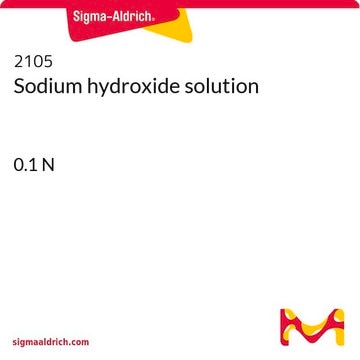1.09137
Sodium hydroxide solution
c(NaOH) = 1 mol/l (1 N), Titripur®, reag. Ph. Eur., reag. USP
About This Item
Recommended Products
agency
reag. Ph. Eur.
reag. USP
Quality Level
vapor pressure
3 mmHg ( 37 °C)
product line
Titripur®
form
liquid
quality
Analyzed in our ISO 17025 accredited QC lab
reaction suitability
reaction type: Acid-base reactions
packaging
Titripac® of
concentration
1 M
technique(s)
titration: suitable
pH
13.7 (20 °C in H2O)
density
1.04 g/cm3 at 20 °C
storage temp.
15-25°C
SMILES string
[OH-].[Na+]
InChI
1S/Na.H2O/h;1H2/q+1;/p-1
InChI key
HEMHJVSKTPXQMS-UHFFFAOYSA-M
Looking for similar products? Visit Product Comparison Guide
Related Categories
Application
- Ozone-Activated Lignocellulose Films Blended with Chitosan for Edible Film Production.: This research involves the use of Sodium hydroxide solution in the preparation and activation of lignocellulose, which is then blended with chitosan to produce edible films, demonstrating a novel application in food packaging (Ebrahimi et al., 2024).
- Tilapia Head Gelatins to Stabilize Fish Oil Emulsions and the Effect of Extraction Methods.: The study explores the use of Sodium hydroxide solution in the extraction process of gelatins from tilapia heads, which are then used to stabilize fish oil emulsions, highlighting an innovative use in food science (Li et al., 2024).
- Study of Cellulose Dissolution in ZnO/NaOH/Water Solvent Solution and Its Temperature-Dependent Effect Using Molecular Dynamics Simulation.: This article investigates the dissolution of cellulose in a ZnO/NaOH/water solvent system, using molecular dynamics simulation to understand the temperature-dependent effects, showcasing the application of Sodium hydroxide solution in material science (Bourassi et al., 2024).
- Potential for Recycling Metakaolin/Slag-Based Geopolymer Concrete of Various Strength Levels in Freeze-Thaw Conditions.: Sodium hydroxide solution is employed in the preparation of geopolymer concrete, which is analyzed for its recycling potential and durability under freeze-thaw conditions, emphasizing its application in sustainable construction materials (Liu et al., 2024).
Features and Benefits
This volumetric solution is analyzed by our calibration laboratory D-K-15185-01-00 which is accredited according to DIN EN ISO/IEC 17025 for analysis of amount-of-substance concentrations in volumetric solutions by DAkkS (Deutsche Akkreditierungsstelle - German National Accreditation Body). The accreditation certificate can be found at www.sigmaaldrich.com/ISO17025.
Packaging
Titripac® packaging - all SKU-pack size numbers ending "4000, 4003, 9010, 9013" - more information on www.sigmaaldrich.com/Titripac
Analysis Note
Amount-of-substance concentration 0.995 - 1.005 mol/L
Measurement uncertainty ± 0.003 mol/L
Traceability NIST SRM
The concentration is determined by volumetric titration and refers to 20°C.
The amount-of-substance concentration of this volumetric solution is traceable to a primary standard reference material (SRM) from the National Institute of Standards and Technology, Gaithersburg, USA (NIST SRM 84 potassium hydrogen phthalate) by means of volumetric standard potassium hydrogen phthalate (article number 1.02400), certified reference material according to ISO 17034, analyzed by our accredited calibration laboratory of Merck KGaA, Darmstadt, Germany according to DIN EN ISO/IEC 17025. The uncertainty is expressed as expanded measurement uncertainty with a coverage factor k=2 covering a confidence level of 95%.
Note: The titer is a correction factor to correct for variations of the volumetric solution, the titration equipment, the temperature and other laboratory conditions. For correct titration results it is recommended to determine a titer with the laboratory specific equipment and under laboratory specific conditions directly after opening a new bottle and at regular time intervals.
Legal Information
related product
signalword
Danger
hcodes
Hazard Classifications
Eye Dam. 1 - Met. Corr. 1 - Skin Corr. 1B
Storage Class
8B - Non-combustible, corrosive hazardous materials
wgk_germany
WGK 1
flash_point_f
Not applicable
flash_point_c
Not applicable
Certificates of Analysis (COA)
Search for Certificates of Analysis (COA) by entering the products Lot/Batch Number. Lot and Batch Numbers can be found on a product’s label following the words ‘Lot’ or ‘Batch’.
Already Own This Product?
Find documentation for the products that you have recently purchased in the Document Library.
Customers Also Viewed
Articles
Application Note: Peroxidase in vegetables – Visual determination after conversion of a specific substrate.
Protocols
Photometric determination with Ammonium vanadate
Photometric determination with Chromazurole S subsequent to acid mineralisation; DIN decomposition
Preparation of a standard solution for Formaldehyde
Photometric determination with Dimethylglyoxime subsequent to acid mineralisation; DIN decomposition
Related Content
Karl Fischer titration determines water content in raw materials and products, a widely used analytical method.
Our team of scientists has experience in all areas of research including Life Science, Material Science, Chemical Synthesis, Chromatography, Analytical and many others.
Contact Technical Service


